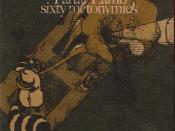Metonymy
1) What is metonymy?
Working definition:
Metonymy is a cognitive process in which one conceptual entity, the vehicle, provides mental access to another conceptual entity, the target, within the same idealised cognitive model (ICM). (Zoltán Kövecses; Metaphor; Oxford University Press 2002)
Metonymy is usually used to get an easier access to something.
difference to metaphor: metaphor uses two domains one of which is abstract and one of which is concrete
2) How to distinguish between metonymy and metaphor:
Metaphor: The creampuff was knocked out in the 1st round.
Metonymy: We need a new glove to play 3rd base.
To check whether it is metonymy or metaphor one has to apply the "is like"- test:
In the metaphor a/the boxer is like a creampuff whereas in the metonymy it cannot be said that a/the baseball player is like a glove.
3) How does metonymy work?
There are two different main types of metonymy-producing relationships:
whole ICM and its parts
parts of an ICM
In the first case either the whole ICM is used as a vehicle to target one of its parts(entities) or one of the entities is used as a vehicle to target the whole ICM.
In the second case entities within the ICM are used as vehicle and target.
3.1) Whole ICM and its parts (usually producing metonymies involving things)
- Thing-and-Part ICM
whole thing for a part like in America for United States
part of a thing for the whole like in England for Great Britain
- Scale ICM
whole scale for the upper end of the scale like in He is speeding again for he is going too fast
upper end of a scale for the whole scale like in How old are you? for What's your age?
- Constitution ICM
object for material...


